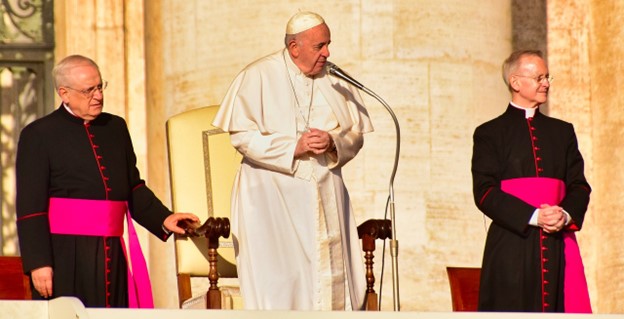Recently, we discussed the vague and conflicting directions given by the Office of the Dicastery of the Doctrine of the Faith of the Roman Catholic Church. In a letter authored by Argentinean Cardinal Víctor Manuel Fernández, and approved by Pope Francis at the end of October, 2023, the Church asserted that “Transgender people can be godparents at Roman Catholic baptisms, witnesses at religious weddings and receive baptism themselves.”
We noted that such instructions fail “to clarify whether a transgender person should be baptized under a name consistent with their birth sex, or with a name consistent with their chosen sexual identity,” or “how a same sex couple could be expected to provide a ‘well-founded hope’ that their child would be ‘educated in the Catholic religion.'”
Rather than clarify these unclear views, In December of 2023, Pope Francis double downed on his obvious intentions to welcome practicing homosexuals into the Roman Catholic Church.
Once more, in a statement prepared by Cardinal Fernandez, which specifically notes that “the document was discussed with the Holy Father,” and that “the text of the Declaration was submitted to the Holy Father for his review, and he approved it with his signature,” the Dicastery now allows for “the possibility of blessing couples in irregular situations and same-sex couples.” Somehow, this is to be accomplished “without officially validating their status or changing in any way the Church’s perennial teaching on marriage.”
The statement begins by claiming that Pope Francis wishes to avoid “’something that is not marriage…being recognized as marriage’…rites and prayers that could create confusion between what constitutes marriage – which is the ‘exclusive, stable, and indissoluble union between a man and a woman, naturally open to the generation of children’ – and what contradicts it are inadmissible. This conviction is grounded in the perennial Catholic doctrine of marriage; it is only in this context that sexual relations find their natural, proper, and fully human meaning. The Church’s doctrine on this point remains firm.”
Yet, “Pope Francis urged us not to ‘lose pastoral charity, which should permeate all our decisions and attitudes’ and to avoid being ‘judges who only deny, reject, and exclude.’ Let us then respond to the Holy Father’s proposal by developing a broader understanding of blessings.”
Further, “(t)he Church…must shy away from resting its pastoral praxis on the fixed nature of certain doctrinal or disciplinary schemes, especially when they lead to ‘a narcissistic and authoritarian elitism, whereby instead of evangelizing, one analyzes and classifies others, and instead of opening the door to grace, one exhausts his or her energies in inspecting and verifying.’”
In other words, Pope Francis claims to reaffirm Church doctrine on what constitutes a marriage, while at the same time, demanding that the Church not be focused on the “fixed nature of certain doctrine” – such as, apparently, what constitutes a marriage.
“Within the horizon outlined” in the Declaration “appears the possibility of blessings for couples in irregular situations and for couples of the same sex.” Yet again, the statement emphasizes that “the form of (this blessing) should not be fixed ritually by ecclesial authorities to avoid producing confusion with the blessing proper to the Sacrament of Marriage.”
“In any case,” the Declaration continues, “precisely to avoid any form of confusion or scandal, when the prayer of blessing is requested by a couple in an irregular situation, even though it is expressed outside the rites prescribed by the liturgical books, this blessing should never be imparted in concurrence with the ceremonies of a civil union, and not even in connection with them. Nor can it be performed with any clothing, gestures, or words that are proper to a wedding. The same applies when the blessing is requested by a same-sex couple.”
Cardinal Fernandez concludes with this cryptic statement; “What has been said in this Declaration regarding the blessings of same-sex couples is sufficient to guide the prudent and fatherly discernment of ordained ministers in this regard.”
Judge Wilson’s (ret.) article concludes tomorrow
Photo: Pixabay
